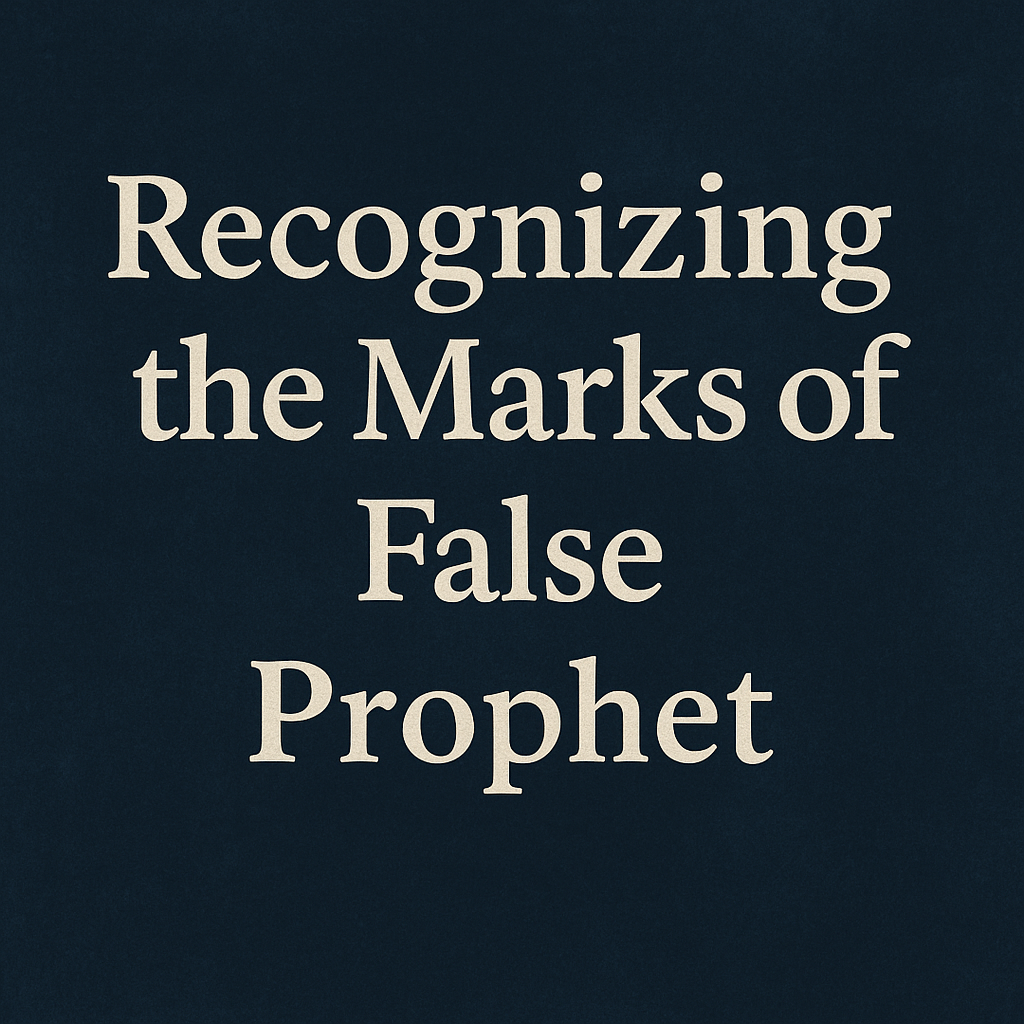⏱️ Estimated Reading Time: 5 min read
Recognizing the Marks of a False Prophet
How to Biblically Discern Spiritual Deception in the Last Days
Written by Dave Jenkins
Contending for the Word – August 8, 2025
Introduction
Jesus warned us plainly in Matthew 7:15, “Beware of false prophets, who come to you in sheep’s clothing but inwardly are ravenous wolves.” That warning wasn’t just for His first-century listeners—it’s for us today. False prophets have always plagued God’s people. They don’t arrive waving red flags. They often look the part of a trusted pastor, author, or social media influencer. They may quote Scripture and speak often of Jesus. But beneath the surface, they twist the truth, exploit the vulnerable, and turn hearts away from Christ.
What are the signs of a false prophet? How can Christians discern truth from error in a world filled with spiritual counterfeits? Scripture gives us both the clarity and the urgency to know the difference. Recognizing false prophets is not merely an academic exercise—it’s vital to the health and faithfulness of the Church.
Distorting the Gospel
At the heart of false prophecy is a corrupted gospel. False teachers often offer messages that sound biblical but leave out what is essential. They may emphasize morality, personal breakthrough, or emotional healing—but avoid the offense of the cross. The biblical gospel centers on sin, grace, repentance, the substitutionary death of Christ, and His resurrection. Anything less is not good news at all.
Paul’s warning in Galatians 1:8 is thunderous: “Even if we or an angel from heaven should preach to you a gospel contrary to the one we preached to you, let him be accursed.” A gospel that does not confront sin or point to Christ crucified is not from God. When leaders downplay the cost of discipleship or redefine grace as license, they are not preaching Christ—they are deceiving their hearers.
Speaking Without God’s Authority
False prophets also speak with confidence—but not with divine commission. In Jeremiah 23, the Lord rebukes those who “say, ‘I had a dream!’” even though “I did not send the prophets, yet they ran.” Rather than speaking God’s Word faithfully, they offer their own impressions, dreams, or mystical experiences.
Today, this takes the form of self-proclaimed prophets who begin sermons with “God told me…” while setting aside the actual words of Scripture. They elevate private revelation above public truth. Instead of expositing God’s Word, they share vague impressions, stories, and emotional appeals. The true prophet is not a visionary mystic—but a faithful steward of Scripture.
Greed and Self-Promotion
A third pattern is greed. As Peter writes in 2 Peter 2:3, “In their greed they will exploit you with false words.” False prophets often use ministry to build their brand, gain influence, or fund their lifestyles. They may promise spiritual rewards in exchange for financial offerings, or they may use emotional manipulation to draw followers to themselves.
Their messages are monetized. Their “anointing” is marketed. Their focus is not the glory of Christ, but the expansion of their platform. Yet the faithful servant of God does not sell healing or manipulate the hurting—he proclaims Christ crucified and serves without strings attached.
Fruit That Reveals the Root
Jesus taught that you will know false prophets by their fruits (Matt. 7:16–20). Their lives and ministries reveal their true nature. Though they may impress with charisma or draw large crowds, their personal character and long-term influence often tell another story.
Look closely: Is their life marked by holiness or hidden compromise? Are their followers growing in biblical truth—or spiraling into confusion, emotionalism, or untested theology? Does their ministry cultivate humility, or does it center on their personality and power? Peter warns that “because of them the way of truth will be blasphemed” (2 Peter 2:2). When a teacher leaves behind spiritual devastation, not gospel transformation, it’s a serious warning sign.
Turning People Away from the Word and the Cross
Perhaps the most dangerous trait of a false prophet is this: they subtly shift attention away from Christ and His Word. They speak in religious terms but lead people to trust in visions, dreams, “activations,” or their own declarations. The cross becomes peripheral. Sin is softened. Hell is rarely mentioned. Instead of pointing people upward in repentance and faith, they point them inward—to their own potential, passion, or destiny.
John warns in 1 John 4:5, “They are from the world; therefore they speak from the world, and the world listens to them.” Their messages tickle the ears but leave the soul untouched. True gospel preaching brings conviction and comfort—it wounds to heal, and it lifts high the Savior, not the self.
Conclusion: Stay Anchored in the Word
The call to discernment is not a call to suspicion—but to Scripture. As 1 John 4:1 exhorts, “Beloved, do not believe every spirit, but test the spirits to see whether they are from God.” Not every voice that claims divine authority speaks truth. And not every leader who quotes Scripture is sent by the Lord.
Discernment is a matter of spiritual survival. If a message does not align with Scripture, it is not from God. If a messenger refuses correction, lives in hypocrisy, or draws attention to self rather than Christ, they are not of Christ.
We follow a Good Shepherd whose voice is clear. He does not confuse or mislead His people. His Word is sufficient. His gospel is powerful. His truth is enough.
Don’t chase signs—follow Scripture. Don’t follow wolves—follow the Lamb.
Check out Contending for the Word Q&A and our YouTube.
Dave Jenkins is happily married to his wife, Sarah. He is a writer, editor, and speaker living in beautiful Southern Oregon. Dave is a lover of Christ, His people, the Church, and sound theology. He serves as the Executive Director of Servants of Grace Ministries, the Executive Editor of Theology for Life Magazine, the Host and Producer of Equipping You in Grace Podcast, and is a contributor to and producer of Contending for the Word. He is the author of The Word Explored: The Problem of Biblical Illiteracy and What To Do About It (House to House, 2021), The Word Matters: Defending Biblical Authority Against the Spirit of the Age (G3 Press, 2022), and Contentment: The Journey of a Lifetime (Theology for Life, 2024). You can find him on Facebook, Twitter, Instagram, Youtube, or read his newsletter. Dave loves to spend time with his wife, going to movies, eating at a nice restaurant, or going out for a round of golf with a good friend. He is also a voracious reader, in particular of Reformed theology, and the Puritans. You will often find him when he’s not busy with ministry reading a pile of the latest books from a wide variety of Christian publishers. Dave received his M.A.R. and M.Div through Liberty Baptist Theological Seminary.




